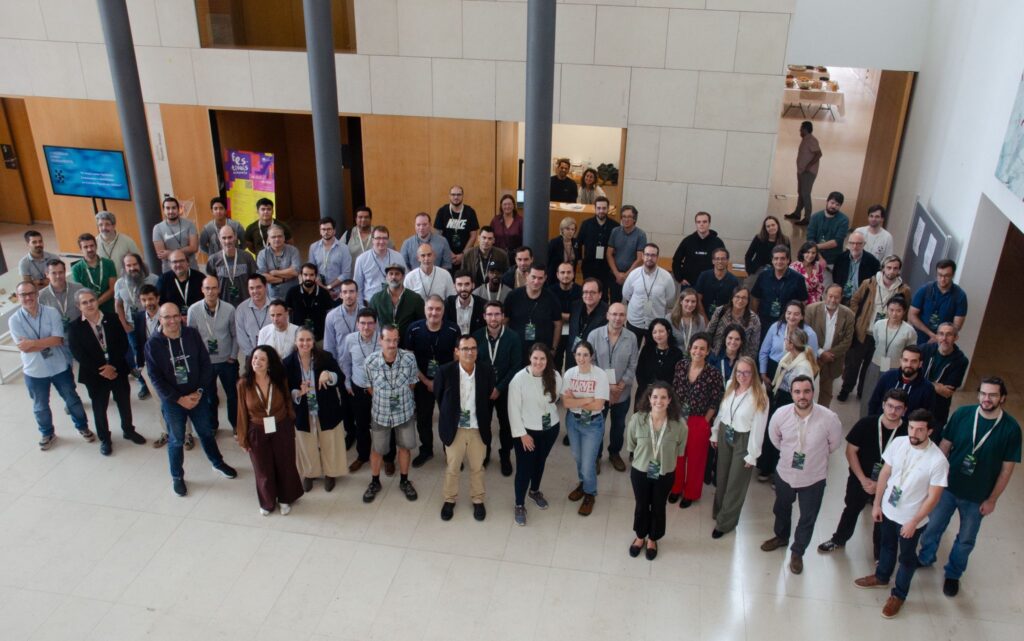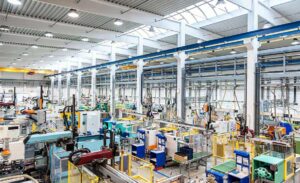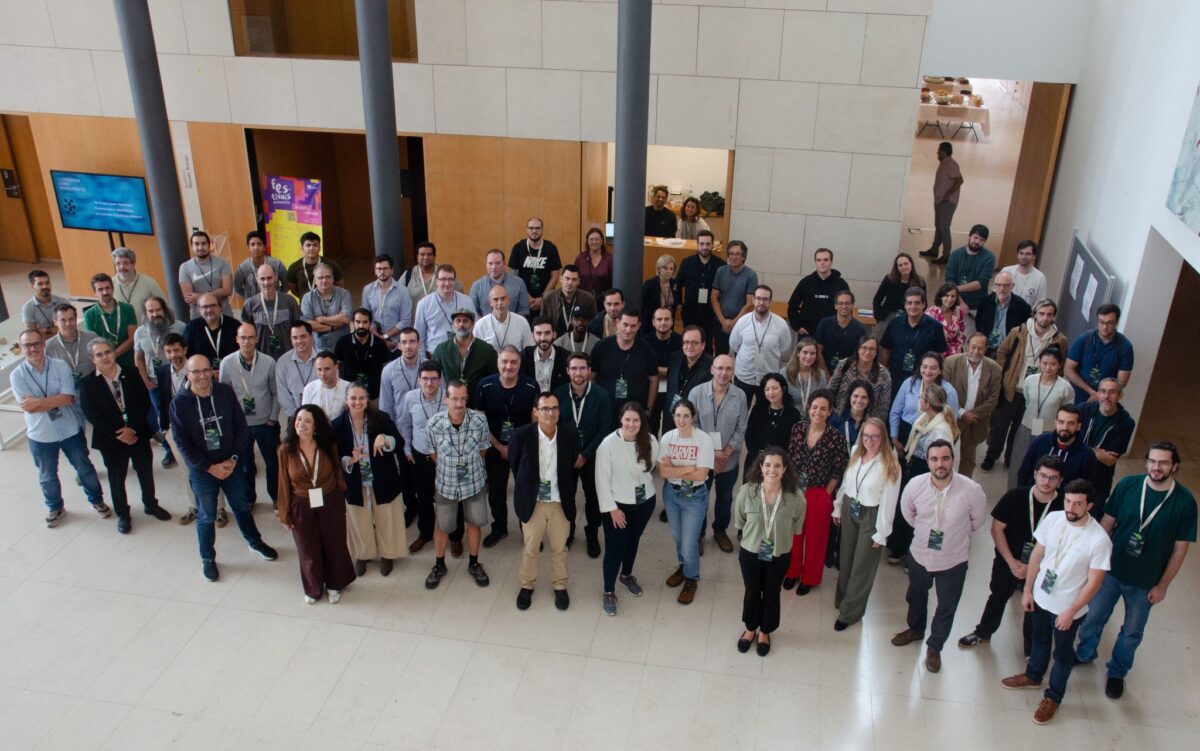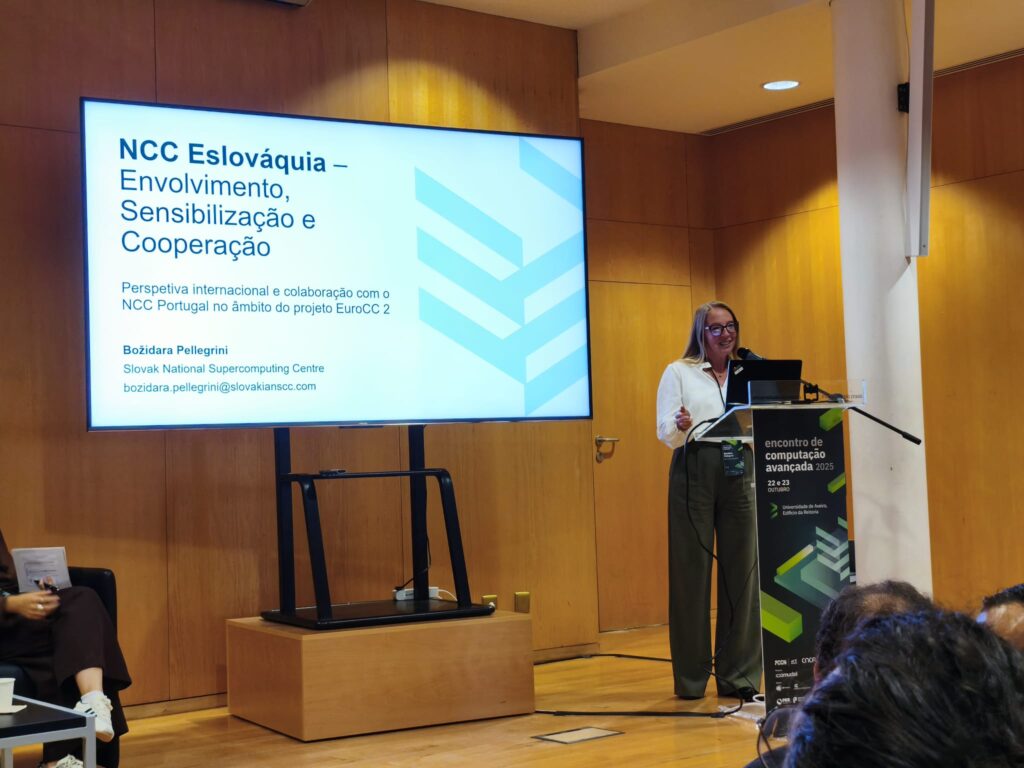NCC Slovakia at the High-Performance Computing Conference in Portugal
On 22–23 October 2025, the 5th High-Performance Computing Conference (Encontro de Computação Avançada) took place at the University of Aveiro – Portugal’s main event dedicated to supercomputing, artificial intelligence, and digital innovation. The National Competence Centre for HPC (NCC Slovakia) was represented by Božidara Pellegrini.
The conference was organised by FCCN/FCT – the National Competence Centre of Portugal (NCC Portugal) and brought together experts from Portugal and guests from partner countries within the EuroCC project to discuss competence development, the use of HPC, and the future of digital science and innovation. The conference programme covered a wide range of topics – from practical workshops on using the Portuguese supercomputer Deucalion, to presentations on MareNostrum 5 and AI Factories, as well as discussions on linking HPC and quantum computing. Other sessions focused on EuroHPC opportunities, access to FCT infrastructures, and user support challenges.
HPC as a bridge between science, industry, and society
Božidara Pellegrini from NCC Slovakia presented how Slovakia is developing its supercomputing ecosystem through the National Supercomputing Centre (NSCC). She emphasised that the Slovak approach is based on three pillars: education, raising awareness, and connecting people from research, industry, and the public sector. Special attention was given to the HPC Ambassadors Programme, which connects NCC Slovakia with industry clusters, chambers of commerce, and innovation agencies. This initiative has helped bring the topic of supercomputing closer to small and medium-sized enterprises, which often do not realise that HPC can also address their everyday challenges – from material development to production optimisation.
She also pointed out that an essential part of HPC development is not only technology but also communication and storytelling. “If we want people to understand what HPC brings, we need to speak their language – through concrete examples, success stories, and visual narratives,” she stressed.
Portugal–Slovakia cooperation within EuroCC 2
In her presentation, Božidara also highlighted the partnership between NCC Portugal and NCC Slovakia, established within the framework of the EuroCC 2 project. Both countries collaborate through bilateral mentoring, exchanging experiences in training, communication, and user engagement.
As a result of this cooperation, a joint series of international webinars on Large Language Models (LLMs) will take place in November 2025. In the first session, Prof. João Magalhães (NOVA LINCS / CMU Portugal) will present the project Amália, which develops a multimodal language model for European Portuguese. The second webinar, led by Dr. Daniel Canedo from the University of Aveiro, will demonstrate how AI and LLMs can be used to detect archaeological sites from aerial imagery.
“These webinars go beyond technology – they are bridges between countries, languages, and scientific communities,” said Božidara Pellegrini. According to her, this kind of cooperation perfectly embodies the spirit of EuroCC 2 – connecting knowledge, people, and innovation across Europe.
Through EuroCC 2, Slovakia continues to contribute to the development of a stronger European network of competence centres, connecting technology, science, and people into a single innovative ecosystem.

 BeeGFS in Practice — Parallel File Systems for HPC, AI and Data-Intensive Workloads 6 Feb - This webinar introduces BeeGFS, a leading parallel file system designed to support demanding HPC, AI, and data-intensive workloads. Experts from ThinkParQ will explain how parallel file systems work, how BeeGFS is architected, and how it is used in practice across academic, research, and industrial environments.
BeeGFS in Practice — Parallel File Systems for HPC, AI and Data-Intensive Workloads 6 Feb - This webinar introduces BeeGFS, a leading parallel file system designed to support demanding HPC, AI, and data-intensive workloads. Experts from ThinkParQ will explain how parallel file systems work, how BeeGFS is architected, and how it is used in practice across academic, research, and industrial environments. When a production line knows what will happen in 10 minutes 5 Feb - Every disruption on a production line creates stress. Machines stop, people wait, production slows down, and decisions must be made under pressure. In the food industry—especially in the production of filled pasta products, where the process follows a strictly sequential set of technological steps—one unexpected issue at the end of the line can bring the entire production flow to a halt. But what if the production line could warn in advance that a problem will occur in a few minutes? Or help decide, already during a shift, whether it still makes sense to plan packaging later the same day? These were exactly the questions that stood at the beginning of a research collaboration that brought together industrial data, artificial intelligence, and supercomputing power.
When a production line knows what will happen in 10 minutes 5 Feb - Every disruption on a production line creates stress. Machines stop, people wait, production slows down, and decisions must be made under pressure. In the food industry—especially in the production of filled pasta products, where the process follows a strictly sequential set of technological steps—one unexpected issue at the end of the line can bring the entire production flow to a halt. But what if the production line could warn in advance that a problem will occur in a few minutes? Or help decide, already during a shift, whether it still makes sense to plan packaging later the same day? These were exactly the questions that stood at the beginning of a research collaboration that brought together industrial data, artificial intelligence, and supercomputing power. Who Owns AI Inside an Organisation? — Operational Responsibility 5 Feb - This webinar focuses on how organisations can define clear operational responsibility and ownership of AI systems in a proportionate and workable way. Drawing on hands-on experience in data protection, AI governance, and compliance, Petra Fernandes will explore governance approaches that work in practice for both SMEs and larger organisations. The session will highlight internal processes that help organisations stay in control of their AI systems over time, without creating unnecessary administrative burden.
Who Owns AI Inside an Organisation? — Operational Responsibility 5 Feb - This webinar focuses on how organisations can define clear operational responsibility and ownership of AI systems in a proportionate and workable way. Drawing on hands-on experience in data protection, AI governance, and compliance, Petra Fernandes will explore governance approaches that work in practice for both SMEs and larger organisations. The session will highlight internal processes that help organisations stay in control of their AI systems over time, without creating unnecessary administrative burden.

